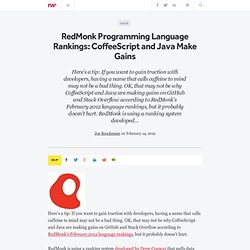

JavaScript Tops Latest Programming Language Popularity Ranking From RedMonk. Industry analyst firm RedMonk published today its latest quarterly programming language popularity ranking.

JavaScript came out on top, followed closely by Java, PHP, and Python. The rankings are based on data collected from the open source project host GitHub and the programming questions and answer site StackOverflow, a measurement invented by Drew Conway and John Myles White in 2010. As I’ve written elsewhere, it’s difficult to determine the popularity of programming languages, but getting some idea of what developers actually like to use is one of many considerations for companies who need to hire developers. No ranking system is perfect, but the RedMonk system has a nice advantage in that they draw on two separate sources of data that correlate nicely and map out into multiple tiers. The graph is pretty hard to read, so RedMonk co-founder and analyst Stephen O’Grady broke it down into a list:
Java Is No Longer Needed. Pull The Plug-In. For nearly everyone, it’s time to dump Java.

Once promising, it has outlived its usefulness in the browser, and has become a nightmare that delights cyber-criminals at the expense of computer users. Java Today Sun Microsystems released Java in 1995 as a technology for building applications that could run on any platform, including Windows, Macintosh and Linux. In its heyday, major browsers embraced Java for running applets within pages.
All anyone needed was a browser plug-in for executing programs. Today, that plug-in has become a top security risk, along with Adobe Flash. The latest security meltdown is a case in point. The Latest Threats In the meantime, criminals are having a field day. Over the just-past Labor Day weekend, the SANS Institute’s Internet Storm Center and Websense reported finding separate phishing campaigns trying to lure people to malicious sites capable of exploiting the vulnerabilities.
What Security Experts Advise So the verdict is clear. Is it time to say goodbye to Java? RedMonk Programming Language Rankings: CoffeeScript and Java Make Gains. Here's a tip: If you want to gain traction with developers, having a name that calls caffeine to mind may not be a bad thing.

OK, that may not be why CoffeeScript and Java are making gains on GitHub and Stack Overflow according to RedMonk's February 2012 language rankings, but it probably doesn't hurt. RedMonk is using a ranking system developed by Drew Conway that pulls data from GitHub and Stack Overflow to gauge language popularity. They first looked at this in September of last year and came up with four tiers of languages. In the first tier, you have the most popular languages like JavaScript, Java, C, C++, C#, Objective-C, Perl, Python, PHP, Ruby and shell scripts. The second tier has languages that are less widely used, but are still fairly popular like Clojure, CoffeeScript, Lisp (Emacs and Common, separately), Haskell, Lua, R, Scheme, Tcl and so on.
The caveat that this applies to very specific communities is important. Changes Since 2011. Cloud9 launches documentation site to support growing Node.js community. JavaScript has come a long way since its inception in the 1990s.

The odd language, which was once confined to simplistic tasks like form validation, has expanded beyond the browser and now powers all kinds of applications from mobile devices to server rooms. The evolution of the language standard and the introduction of heavily optimized implementations have made JavaScript a respectable choice for building serious applications. Although the language is still burdened by some idiosyncrasies, its intrinsic flexibility is proving to be valuable.
One of the major technologies that has driven adoption of JavaScript on servers is Node.js, an open source software framework for building scalable applications with JavaScript. Its efficient, event-driven approach to I/O makes it well-suited for building real-time Web applications. We spoke with Cloud9 CEO Ruben Daniels about Node.js and some announcements that Cloud9 is making this week concurrently with Node Summit.
Cloud9 on Node.js.